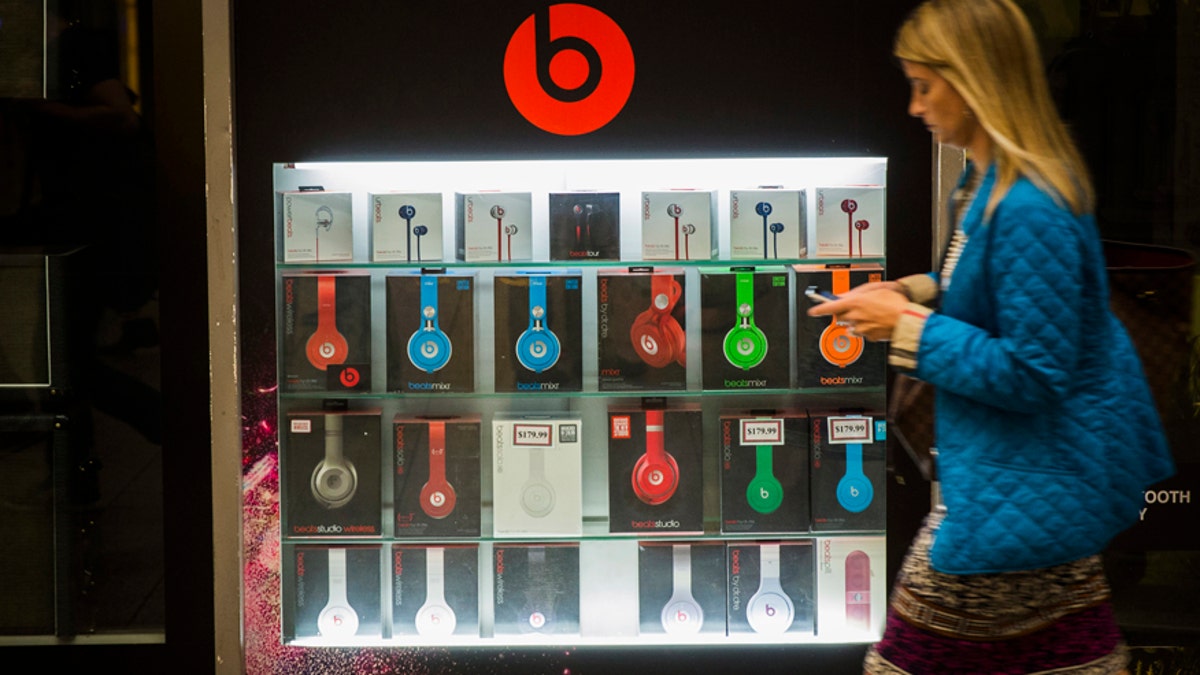
A pedestrian walks past a Beats brand display in the subway system of New York, May 29, 2014. (REUTERS/Lucas Jackson)
When you spend $3 billion on an acquisition, you better have a good idea - a truly brilliant idea - about how you're going to make it work. Now, it's becoming clear how Apple is going to leverage its investment in Beats, with a clever strategy that may simultaneously extend its tightly spun ecosystem and revive its music business.
The company is reportedly working with Nine Inch Nails tough guy Trent Reznor to put some muscle into a redesigned version of the streaming Beats Music service, which Apple purchased last year along with the better-known headphone business. At the moment, the Beats subscription service is an also-ran behind the likes of Spotify, Pandora, and a raft of other streaming music services. But as listeners have been eschewing iTunes purchases (just like they abandoned CDs) in favor of streaming music services, Apple has been keen to get its music mojo back.
Some in the music business have been skeptical that Apple's efforts will succeed. There's too much competition. Songza has a cool vibe with countless "curated" playlists for discovering music. Rdio has an album oriented following. Pandora pioneered personalized stations. And Spotify lets you rock out by selecting any song you want for free.
But Apple may have an ace in its pocket, and I don't mean the dedicated base of iPhone and iPad users. Apple's got its sights on the one place where many people listen to music the most: the car. The company's CarPlay app for connected cars is just starting to roll out now and will feature prominently at the New York International Auto Show this week. It works with connected iPhone 5 handsets or later models, with a limited number of apps running on the dashboard. With dozens of car makers promising to support the service, CarPlay is the perfect instrument to reach dedicated radio listeners - and a way to close out the competition.
For example, distinctly absent from both Apple CarPlay and Google's competing Android Auto app are two of the most well-known music services, Pandora and Rhapsody. Apple plans to limit the apps available in CarPlay, focusing on those that are relevant to drivers, such as navigation, hands-free calling - and music. Apple, not the car companies, will determine what appears in CarPlay. So far it has included a couple of music-oriented apps, including Spotify and Rdio, but whether Apple allows additional competing services remains to be seen.
CarPlay not only can lock out streaming music competitors, it can also - in a backhanded way - lock out traditional sources of music in the car - AM and FM radio stations. That's because you cannot use the CarPlay app to scan or switch radio stations; that's on a separate screen the automaker controls. So in a typical scenario, an iPhone owner will slide in behind the wheel, plug their phone into the car (it will only work using a cable) and up will pop CarPlay. The most convenient move to make then is to tap the music icon, which pulls up Apple's options only.
Getting to regular broadcast radio stations requires switching out of CarPlay and back to the automaker's screen. You can tap in WFUM, for example, and then go back to, say, maps in CarPlay, but it's an extra step. And as consumers get more accustomed to simply switching on CarPlay and pulling out of the driveway, it's my guess that fewer and fewer will bother to switch back to FM.
Broadcasters have not been blind to this prospect. The Clear Channel radio network, for example, renamed itself last year as iHeartMedia in recognition of the importance of its digital future. It could see the digital writing on the wall years ago and has been pushing its iHeartRadio app for some time. Indeed, iHeartRadio is in virtually every major connected car system already. And it is included in CarPlay and Android Auto. Google's software also includes TuneIn, which collects thousands of radio stations from around the world in a single app.
If CarPlay lives up to its hype and significantly changes how we interact with our cars, Apple's revamped Beats Music service could be a major beneficiary even if it's priced the same as or higher than competing services. And it's certainly not going to be cheaper because record labels are not going to cut Apple any special deals this time. The tech giant learned that lesson the hard way with iTunes.








































